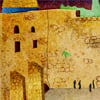Question:
Why do Jews pray at the Western Wall (or Wailing Wall) in Jerusalem? It seems redundant and out of place praying facing a wall, when one can pray in a synagogue or at home or anywhere, and G‑d will listen to their prayers. Is G‑d more prone to listen and answer prayers recited at the Western Wall than at other locations?
Answer:
I think what you’re really asking is: If G‑d is everywhere, why should prayer be more effective in one place than another? In truth, the same can be asked regarding praying in a synagogue vs. praying at home.
The question has been asked many times before in classical Jewish literature. Since this is a Chabad site, I’ll provide the answer given by Rabbi Schneur Zalman of Liadi (1745–1812), the first rebbe of Chabad.
The essence of his answer is that although G‑d is everywhere, His light shines stronger in some places than in others. He compares this to the human body: You are everywhere in your body, yet you are far more conscious of your mind than of your toes. So too, in the universe that G‑d created, there are places, times and states of being where we are able to be more aware of Him—and it is from those places/times/states that our prayers can fly best.
Any person is able to create for himself a time of day and a special place from which he or she reaches out to G‑d. And we all should—somewhere in our homes or gardens, set aside a place of prayer and meditation, along with a time of day or week that we sit there and connect. Even more special is a place that was chosen not just by us, but by G‑d as well. And that is the Temple Mount, which G‑d chose as His dwelling place in the time of King David.
Ever since then, that specialness has never left the Western Wall, the only remnant left standing.
The Talmud tells us that every synagogue is a “minor Holy Temple.” Thus the above also applies—in smaller measure—to any location designated to be a house of worship for G‑d.
Refer to the following links for more information on these topics:
Rabbi Tzvi Freeman for Chabad.org









Join the Discussion